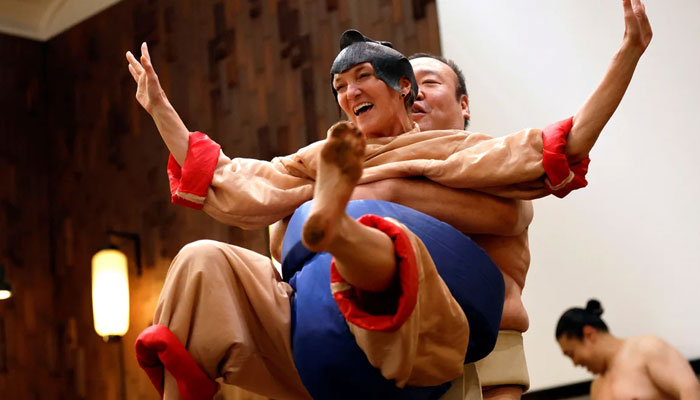Retired Sumo wrestlers fight tourists with entertaining demonstrations
The weakened yen has made such trips more affordable than ever before, creating a surge in tourist interest
July 09, 2023

Ohtori dedicated two decades of his life to the demanding world of sumo wrestling, striving for victories to climb the ranks of Japan's traditional sport. However, his focus has now shifted to entertaining a different audience: curious tourists.
Alongside five other retired wrestlers, Ohtori participates in captivating sumo demonstrations designed to engage and educate the influx of international travellers who have returned to Japan after a two-year hiatus due to the Covid-19 pandemic.
The weakened yen has made such trips more affordable than ever before, creating a surge in tourist interest.
"My goal is to foster a deeper understanding of sumo among both foreigners and Japanese people," expressed Ohtori, now 40 years old.
Known by his full ring name, Koto-Ohtori, which means "harp phoenix," he reflected on his professional days and the rough nature of the sport.
However, he finds greater enjoyment in the present, where he can interact and engage with a diverse audience.
Yokozuna Tonkatsu Dosukoi Tanaka, Ohtori's performance venue, opened its doors in central Tokyo in November 2022, just a month after Japan resumed visa-free travel.
Inside the establishment, guests are treated to a sumo ring and 14 tables, where they can savour breaded pork cutlets before immersing themselves in the sumo action, both as spectators and participants.
The restaurant was established by another former sumo wrestler, Yasuhiro Tanaka, who started a company to provide ex-wrestlers with second careers in acting.
Tanaka aspires to recruit more wrestlers for evening performances.
During a recent afternoon demonstration, Ohtori engaged in comedic and realistic sparring with his larger opponent, Towanoyama, fondly referred to as "Jumbo" by the English-speaking emcee to cater to the foreign audience. Guests like Jose Aguillar from Monterrey, Mexico, and his family eagerly awaited the opportunity to witness something iconic from Japan on their delayed vacation.
Aguillar, who had ringside seats, embraced the chance to don a sumo costume and face Jumbo in the ring, describing the experience as "amazing."
Themed restaurants, such as this sumo-themed establishment, play a significant role in Japan's tourism ecosystem. Prime Minister Fumio Kishida aims to leverage this sector to boost the nation's economy by an estimated 5 trillion yen annually.
Furthermore, sumo itself has experienced a resurgence following the success of the Netflix drama series "Sanctuary," which centred around the sport and gained popularity in May.
While the lunch performances are filled with laughter and entertainment, the visible scars on Ohtori and Jumbo serve as a reminder of the physical toll sumo takes on its participants.
Starting as teenagers, many wrestlers face limited employment prospects once they retire from the sport in their 30s.
Yasuhiro Tanaka, now 47, acknowledges that during their sumo careers, there was little room for leisure.
His current goal is to provide wrestlers with opportunities to earn a salary and lead happy and fulfilling lives after retiring from the demanding world of sumo.









